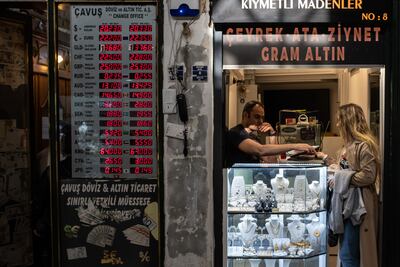Kurds in Turkey have expressed regret at what many considered a dark day as President Recep Tayyip Erdogan secured another five years at the helm of the country.
Most Kurdish voters supported Kemal Kilicdaroglu, leader of the Republican People's Party (CHP), who was Mr Erdogan's opponent in the presidential race.
“The things we always complain about won’t come in the next five years. It's upsetting. The Kurds did the right thing to support Kilicdaroglu, there was a hope he would bring justice, democracy and peace to Turkey. There was no other option because Erdogan won’t do any of these,” said Adem Yalcin.
“We need to come together and raise our voice for peace for the Kurds and to fight for Kurdish rights – guaranteed, in a peaceful way,” he said.
Following decades of restrictions, Mr Erdogan and his conservative Justice and Development Party (AKP) previously lifted some of the social and linguistic restrictions imposed on Kurds.
But any warming of ties disintegrated when Mr Erdogan ended peace talks with Kurdish insurgents and unleashed a sweeping crackdown in the wake of a failed 2016 coup.
Many senior Kurdish politicians and activists remain detained, while some mayors in towns dominated by Kurds have been replaced by Ankara.
“There is injustice applied by the AKP on Kurdish cities, like appointing trustees to govern,” said Istanbul resident Yasin Savci, 39.
“We hoped there would be an end to this injustice. Erdogan needs to go back to 10 years ago when he opened civil societies and tried to reach out to the Kurds. But with his coalition it’s not possible, he’s backed by far-right guys. With this team, it’s not possible to go back.”
Kurds in Turkey make up about a fifth of the population and typically come from the east and south-east of the country.
“I felt like I woke up in a nightmare,” said 35-year-old Hashem Kilic. “I thought we would change the dictatorship, but it didn’t happen. But life still continues, we have to demand change and we have to try and get it. We have thousands of Kurds in prisons, the Erdogan regime imprisoned all of them.”
Splintered opposition
Mr Kilicdaroglu, who was backed by a multi-party coalition, was about 4 four per cent behind Mr Erdogan in the second round of the election.
He had presented the biggest challenge to Mr Erdogan's two decades of leadership when he forced a run-off after the incumbent President fell just short of the 50 per cent of the vote required in the first round.
Both sides courted smaller parties to bolster their voting tallies for the second round. Mr Kilicdaroglu increasingly used anti-refugee rhetoric and hammered out an alliance with Umut Ozdag, the leader of the far-right Victory Party.
That move alarmed many Kurds and Turkey's pro-Kurdish party, although the latter still said it would back Mr Kilicdaroglu.
“Can you imagine the far right and Kurds working together? It’s not reality. It affected the motivations of people. That’s why even under these awful living conditions, Erdogan has once again won,” said Azmi Usta, 42, drinking tea outside as the dust settled on Monday morning.
Turkey is facing a difficult economic situation, with inflation soaring and the Turkish lira continuing to drop against the US dollar. The financial difficulties have in part been blamed on Mr Erdogan's unorthodox economic policies.

Voter turnout was lower in the second round compared to the first, particularly in traditionally Kurdish areas. It is thought this may have been because some Kurdish voters' support of Mr Kilicdaroglu cooled after his pursuit of far-right alliances and anti-refugee rhetoric.
But while it is believed there are a few hundred thousand or so Kurdish voters who participated in the first round but not in the second, Mr Kilic does not believe it would have changed the final result.
“I’m sure we will be blamed, even though it's not true. They shouldn’t blame the Kurds, [the opposition] should check their history and find their own mistakes. Of course, it was bad to ally with a far-right politician. If you make a deal with the far right, of course, the Kurds have sentimental feelings. Why would the Kurds be supportive of this, of course, some will say 'no',” he said.
Mr Usta said the opposition was too broadly and unrealistically spread.
Emre, a 28-year-old baker, said he had expected change but it failed to happen.
“I'm sad because the work conditions are really difficult, the economy is in really bad shape – we can’t survive in these economic conditions. I hope [Erdogan] will make it work, but I doubt it.
“Umut Ozdag is the enemy of the Kurdish people, and the Kurds didn’t like Kilicdaroglu partnering with an enemy of ours. This is why many Kurds didn’t go to the ballot box in the second round.
“It’s been 20 years of Erdogan, and I don’t think in the near future his policy on Kurds will change. I don’t have any expectations that he will talk to the Kurds,” added Emre, referring to failed negotiations between Mr Erdogan's government and the Kurdistan Workers' Party (PKK) armed group. The Turkish government regards the PKK as a terrorist organisation.
“Under these circumstances, I don’t think Turkey’s future will be bright.”





































